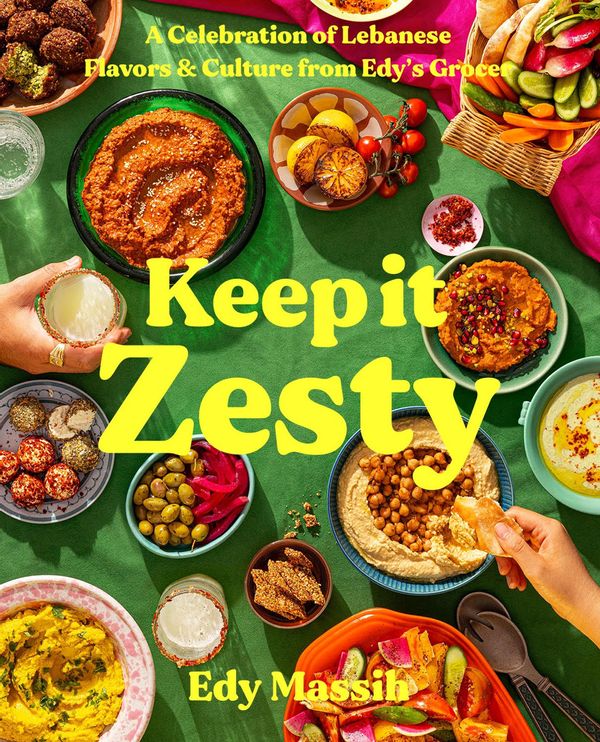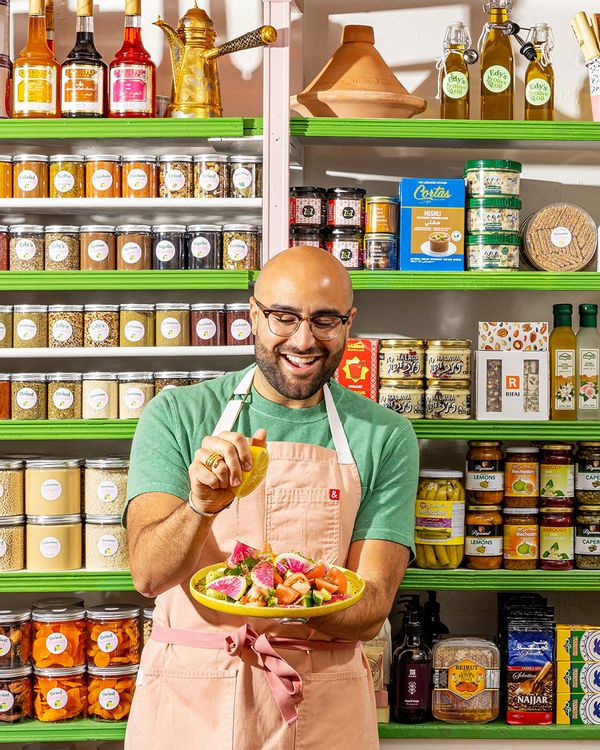I was never a massive hummus fan. So many of my pals in college would eat their weight in hummus, but it just never clicked with me. This was until I tried hummus at a Lebanese colleagues' parents' house. It blew me away.
This was one of the first things I thought of when I saw "Keep it Zesty: A Celebration of Lebanese Flavors & Culture from Edy's Grocer" Edy Massih's new cookbook highlighting Lebanese food and tweaking it in different modernized ways. Of course, when we spoke, hummus indeed came up!
Massih also spoke about what first drew him to food and cooking, why he felt his neighborhood needed a Lebanese grocery store, the deep importance of Riz a Jej and the myriad reasons why he transitioned away from restaurant kitchens.
The following interview has been lightly edited for clarity and length.
 Keep It Zesty by Edy Massih (Photo by Jessica Marx)
Keep It Zesty by Edy Massih (Photo by Jessica Marx)
Your recipes take traditional Lebanese cuisine and tweak them a bit to modernize or otherwise 'update' them. Can you give me an example of a recipe in this book that exemplifies this?
One good example of this is the Kale Tabbouleh. Tabbouleh is normally made with parsley, but I've modernized it for the grocer using kale. With a kale base (there's still parsley in it, just not as much!), it requires less prepping and lasts longer in the fridge. In this recipe, I also use pearl couscous instead of bulgur to add to the texture.
For those unaffiliated or unfamiliar with Lebanese cuisine, how would you explain its tenets and fundamentals?
The food is fresh, with a focus on produce, herbs and of course, spices. There is a lot of marinating overnight, so as to engulf the dish in flavor.
I'm such a fan of the recipes, from the mezze and dips to the salads and desserts. Would you be able to pinpoint a singular favorite of yours? (I know it's tough!)
Riz a Jej is probably my favorite recipe in the book. It's a Lebanese dirty rice and it just brings me back to growing up in Lebanon and being in my Grandmother's kitchen. She would make it for every holiday and now we make it everyday at the grocer.
 Edy Massih (Photo by Jessica Marx)
Edy Massih (Photo by Jessica Marx)
What are the three most important ingredients for any cook looking to get into Lebanese cooking?
I'd say lemon, olive oil and spices (sumac, za'atar, aleppo pepper). Does that count as three?
What stands out for you as a formative moment that got you into cooking or food at large?
I got into cooking by just growing up in my Grandmother's kitchen, taking it all in and then moving to America where I no longer had access to that kitchen or that food. I craved those same flavors, dishes, memories and comforts of home, so I started cooking to create that for myself.
Want more great food writing and recipes? Subscribe to Salon Food's newsletter, The Bite.
What was the development process of the book like?
It was so much fun to really dig deep into my memories of all the recipes I grew up with and those I have come up with over the last eight years cooking professionally, including the staple dishes on the menu at the grocer and adapt them all for a home cook. As a caterer, I cook in really large quantities, so it was challenging but so much fun to scale those back for home cooks for the book.
What would you say is an ideal “gateway” recipe for someone who’s never cooked or eaten Lebanese food before?
Any of the mezze dips! They're simple enough to cook and for the most part, flavors everyone is familiar with. For example, everyone loves hummus and they don't necessarily realize how easy it is to make it themselves at home.
Can you talk a bit about the founding of Edy’s Grocer?
Living on the same block in Greenpoint for seven years. I developed a relationship with Maria who owned Maria's Deli, the Polish deli on my street corner. I would always trek down to Sahadi's anytime I needed Lebanese ingredients for catering. It just hit me that a Lebanese grocery store was so missing and needed in North Brooklyn. Maria was ready to close Maria's Deli and she reached out to see if I was interested in taking it over. The rest is history!
We need your help to stay independent
How do you practice sustainability in your cooking?
We really try to have very minimal waste at the grocer. I would always rather sell out than have too much food [or] food go to waste. We also partner with Too Good To Go to sell items that are left over from the day.
 Mujadara (Photo by Jessica Marx)
Mujadara (Photo by Jessica Marx)
What’s your biggest tip for cutting down on food waste?
Be creative about utilizing everything in the kitchen. For example, we use chicken bones and vegetable "scraps" to make stocks, plus chicken and salmon "scraps" from our skewers to make our chicken and salmon salads. There is always a use for anything leftover in the kitchen.
What does “keep it zesty” mean to you? How does it encapsulate your approach to cooking and eating?
For me, it really just means to have fun in the kitchen, which is what it's all about for me! Don't take things too seriously — cooking should not be daunting, it should be approachable and fun.
I read this quote in one of your recent interviews in regards to working in restaurants and catering: "It’s so hostile and every day was a battlefield of who’s better than each other. It was never to make movement." I find that that's something pretty acknowledged in most press about the industry and it's striking to read, especially for those entirely unaffiliated with the inner workings of the industry at large. Could you speak a bit to that and your pivoting to your own company in response to it?
From my perspective, being in this industry, we should all be helping each other out and lifting each other up. Community has always been such a big part of this industry for me and I try to stick to that day in and day out, jumping up to help if anyone has a problem and also having people to reach out to if I have a problem! After all, that's what small businesses are about. That's not really the case in kitchen culture, [which is] built for competition and [the] individual rather than group rewards.
If we lift each other up, we can become better together as an industry.



Shares